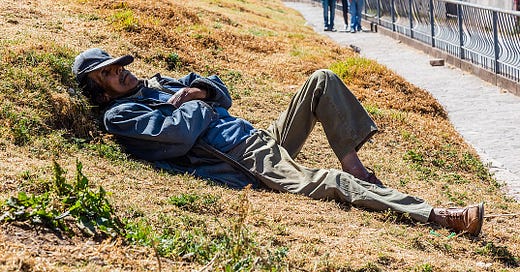
I apologize for the lack of productivity here over the course of last couple of weeks. There has been a death in the family, requiring a trip to the Adirondacks, and a great deal of time for me and my wife’s family to deal with it.
But the forever-sleep of death now experienced by my nearly 95-year-old father-in-law got me to thinking about the temporary kind of sleep you and I experience every night. Anyone over 50 who is reading this — and I’m guessing that’s nearly all of you — knows what I’m talking about. We just don’t sleep like we used to.
I’ve always been a light sleeper compared to most people I know. Still, when I was in college, I could doze through disturbances that would, in 2023, jolt me out of slumber, thoroughly convinced that someone was trying to break into my house, whack me and bury my remains in a gravesite next to Whitey Bulger’s in St. Joseph’s Cemetery.
A recent look at sleep in the New York Times’ The Morning newsletter was, shall we say, eye-opening. It’s been several years since I’ve had a truly great night’s sleep. At 66, I now grade on a curve. If I nearly sleep through the night for six or seven hours and don’t have to get up for any reason, then I declare the overnight event to be a success. I rarely have trouble simply falling asleep; staying asleep is the challenge.
On the other hand, as one sleep specialist told The Times, “By definition, if you’re using an alarm clock to wake up, then you are chronically sleep-deprived.” If you’re getting enough sleep, you’ll wake naturally when you’re rested, he added. Using that gauge, maybe I sleep better than I think. I only retired a little more than a year ago but can’t remember the last time I set an alarm. I just magically wake up at 5 a.m., or, as I stated previously, sometimes even earlier.
If I wake up at 3 or 4, I can usually sense whether I’m capable of falling back to sleep after 15-20 minutes. If I’m convinced that I can’t, then I’ll read for a bit and then rise at 4:30, or sometimes earlier, and start my day. Not surprisingly, on those particular days, I’m inclined to nod off spontaneously in my office chair for 15 minutes.

The problem seems to get worse in the summer, when additional evening light suppresses the body’s production of melatonin, the hormone that tells us it’s time to go to sleep. Moreover, the hot temperatures we’ve seen this summer inhibit deeper sleep, even with the AC on. And when it starts to become light at 4:30 a.m., the body receives signals that it’s time to rise, weakening our circadian clocks. As much as I love the warmth and outdoor activity associated with summer, it wreaks havoc on my already-fragile sleep regimen.
Finally, a low-key activity that winds you down to prepare for sleep is in order before or even after you climb into bed. I generally read a book on my iPad, with the screen in dark mode (white text with black background). I prefer it to a physical book that requires lighting from above. If you can find something funny to read, grab it. I’ve found that a little light laughter is just the tonic I need to fall asleep.
One more thing. I’ve been advised by a friend that there are some nutritional supplements you can take that will allow you to get those elusive last two hours of sleep. He recommended Inositol, a dietary supplement often used by pregnant women to help them sleep better, and to treat certain mental conditions in both sexes.
I did find that a 900mg dose before bedtime caused me to sleep more soundly, but I awoke in the morning with one of the those Sominex-style, sleeping-pill hangovers. That’s strange because Inositol is a dietary supplement, not a medication. Some people have reported that Inositol caused stomach discomfort, though it did not for me.
That’s all for now. I will have something to say soon about how to avoid toxic politics and the Hollywood writers’ strike, which was recently joined by actors, including an old friend from high school. Meanwhile, sweet dreams …
P.S. My father-in-law’s was a life exceedingly well lived. You can read his obituary here.




I’m with you, brother. Someone broke it down for me a few years ago; “You served in the infantry in two wars. Why would you expect to sleep well?” I use a white noise machine bedside and have used a weighted blanket (fifteen pounds) when needed. The weighted blanket keeps you in place if you wake with a start, and makes it much easier to go back to sleep. No inositol yet...
If I listen to the Audible version of Walter Isaacson’s biography of Einstein I’m asleep within 5 minutes. I like Isaacson but was terrible at most Science classes.